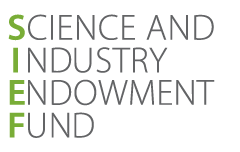December 2020 Newsletter

Dear SIEF supporter,
In these last twelve months, we have experienced profound changes in our world. In such times, it is science that we turn to, to seek answers, find solutions and enable evidence-based decision making. This cannot be done without investing in science.
Since 2009 SIEF has been investing in critical research and infrastructure, contributing to the nation’s ability to address issues of national importance including climate change, pandemic preparedness, supply chain integrity and manufacturing. The SIEF Annual report, published in October provides a snapshot of the science SIEF has supported and its impact for the nation. The investments SIEF has made are enabling Australia to respond to its biggest challenges and become a more resilient and self-sufficient nation as well as addressing issues of global significance.
In this newsletter I’m pleased to provide news on the projects that have been supported this year. SIEF continues to fund science that benefits the nation and I look forward to sharing further updates with you in 2021.
I wish you and your families a safe and restful festive season.
Dr Melissa Straffon
SIEF Manager
(03) 9545 7952 or 0408 134 581
Experimental Development Program
The EDP continues to fund new projects to advance technologies at TRL4 and progress them towards a commercial future. Three new projects have commenced in 2020.
Titanium Particulates to Wire
Titanium wire is an important feedstock for use in additive layer manufacturing and in the production of powder for use in additive manufacturing. The market for titanium wire is expected to grow on the back of increased use in manufacturing components for aerospace applications. CSIRO has invented and patented a process for the continuous conversion of low-cost titanium particulates from virgin and recycled sources to titanium wire. Recycling the thousands of tonnes of titanium swarf generated by industry in subtractive manufacturing processes back into wire for use in additive layer manufacturing is becoming increasingly important for the aerospace industry. CSIRO’s process will assist in developing a circular economy for titanium, reduce the cost of producing wire and enable point of use wire production from waste materials.
Antifibrotic Coatings
Fibrotic encapsulation is a vital immune response that allows the body to address the risks associated with foreign objects becoming lodged in tissues accidentally. A broad range of medical devices also initiate the same immune reaction, known as the foreign body response (FBR), upon implantation. This response results in collagen accumulation at the surface of the implant and fibrous encapsulation, often leading to reduced device function or device failure. In collaboration with the Florey Institute, CSIRO has developed a coating technology that has demonstrated reduced FBR in vivo. This project will enable testing the technology further with the aim to de-risk the technology and to attract industry investment.
Perovskite Photovoltaics
Conventional silicon photovoltaics (PV) efficiencies are reaching their maximum technical potential, with yield improvements increasingly driven by marginal improvements in deployment costs. The opportunities for significant improvement are therefore in alternative chemistries that can deliver higher conversion efficiencies while retaining cost advantages of mass manufacture methods and infrastructure. The project will demonstrate prototype fabrication of thin-film perovskite PV cell and module technology as a minimum viable product with the aim of increasing industry confidence and progress the technology towards commercialisation.
PFRAs in the Department of Industry, Science, Energy and Resources (DISER) portfolio that are developing technologies with commercial potential are encouraged to apply for funding to progress to commercial opportunities. Information and guidelines are available on the SIEF website and if you wish to discuss your opportunity further please contact sief@sief.org.au .
The NICTA Gift
In the last twelve months, significant investments have been made in Digital Initiatives addressing supply chain integrity and food provenance, and genomics.
Supply Chain Integrity Phase 2 Digital Initiative
Australia has a reputation for high quality food that is safe to eat. Trust in the provenance of that food – including region of origin, sustainability and ethical production – creates premium products that command higher prices. The Supply Chain Integrity initiative is developing technologies that enhance brand trust, privacy and efficiency for producers, making the Australian industry more competitive and able to secure new growth markets. The research being undertaken includes:
- addressing how to generate trustworthy provenance information on the farm and reduce regulatory burden through automated compliance
- creating physical signatures of products to verify the biological origin of an agricultural product, reducing the likelihood of product substitution
- tracing products through the supply chain using data analytics.
Genomics Phase 2 Digital Initiative
Genomics and ‘omics technologies can play a key role in maximising the efficacy, diversity, biosecurity and yield of agricultural species under changing and challenging conditions. Both ‘omic breeding strategies and genetic engineering rely on accurate software prediction tools. Unfortunately, current data methods and tools are often unsuited to analyse and exploit population scale genomics and ‘omics data. This Digital Initiative will provide new opportunities to improve productivity for Australian industries through the delivery of a new software platform that will further accelerate the discovery of new knowledge to inform biological system interventions such as gene editing and breeding selection of any species.
Further information about the SIEF Digital Initiatives can be found on the SIEF website.
